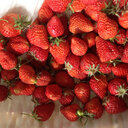Alpha-linolenic acid but not conjugated linolenic acid is hypocholesterolaemic in hamsters.
Palavras-chave
Resumo
Conjugated linolenic acid (CLN) refers to a group of octadecatrienoic acid isomers that have three double bonds in conjugation. Both pomegranate and tung seed oils are rich in CLN but the major isomer in the former is cis9,trans11,cis13 while in the latter it is cis9,trans11,trans13. The present study examined the effects of CLN, isolated from either pomegranate seed oil or tung seed oil, and alpha-linolenic acid (LN), isolated from flaxseed oil, on serum cholesterol levels in male hamsters (body weight 105 g; age 10 weeks) fed a 0.1% cholesterol and 10% lard diet, for a period of 6 weeks. All hamsters were allowed free access to food and fluid. The blood samples were taken by bleeding from the retro-orbital sinus into a heparinized capillary tube under light ether anaesthesia after overnight fasting at weeks 0, 2, 4 and 6. It was found that supplementation of CLN at levels of 12.2-12.7 g/kg diet exhibited no significant effect on serum cholesterol level while LN at a similar level of supplementation had serum cholesterol reduced by 17-21% compared with the control diet containing no LN and CLN. Supplementation of CLN and LN significantly decreased hepatic cholesterol but no effect was observed on heart and kidney cholesterol levels. It was concluded that LN possessed hypocholesterolaemic activity while CLN had no effect on blood cholesterol, at least in hamsters.



